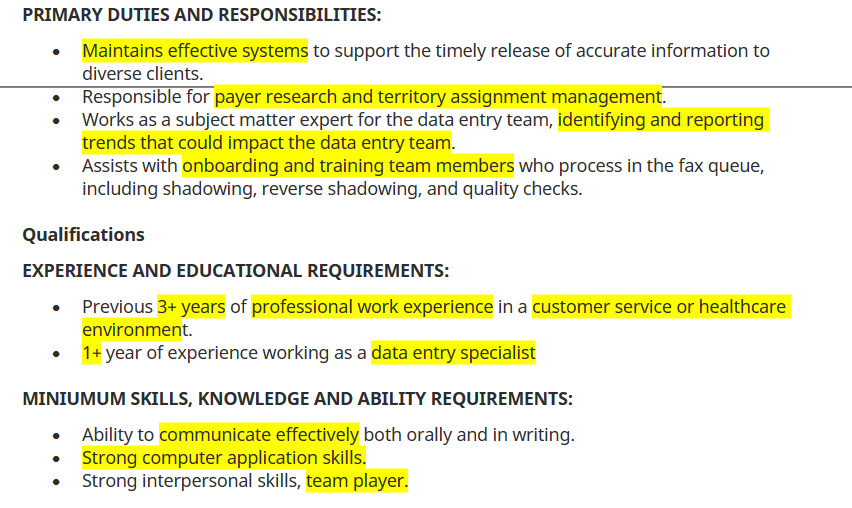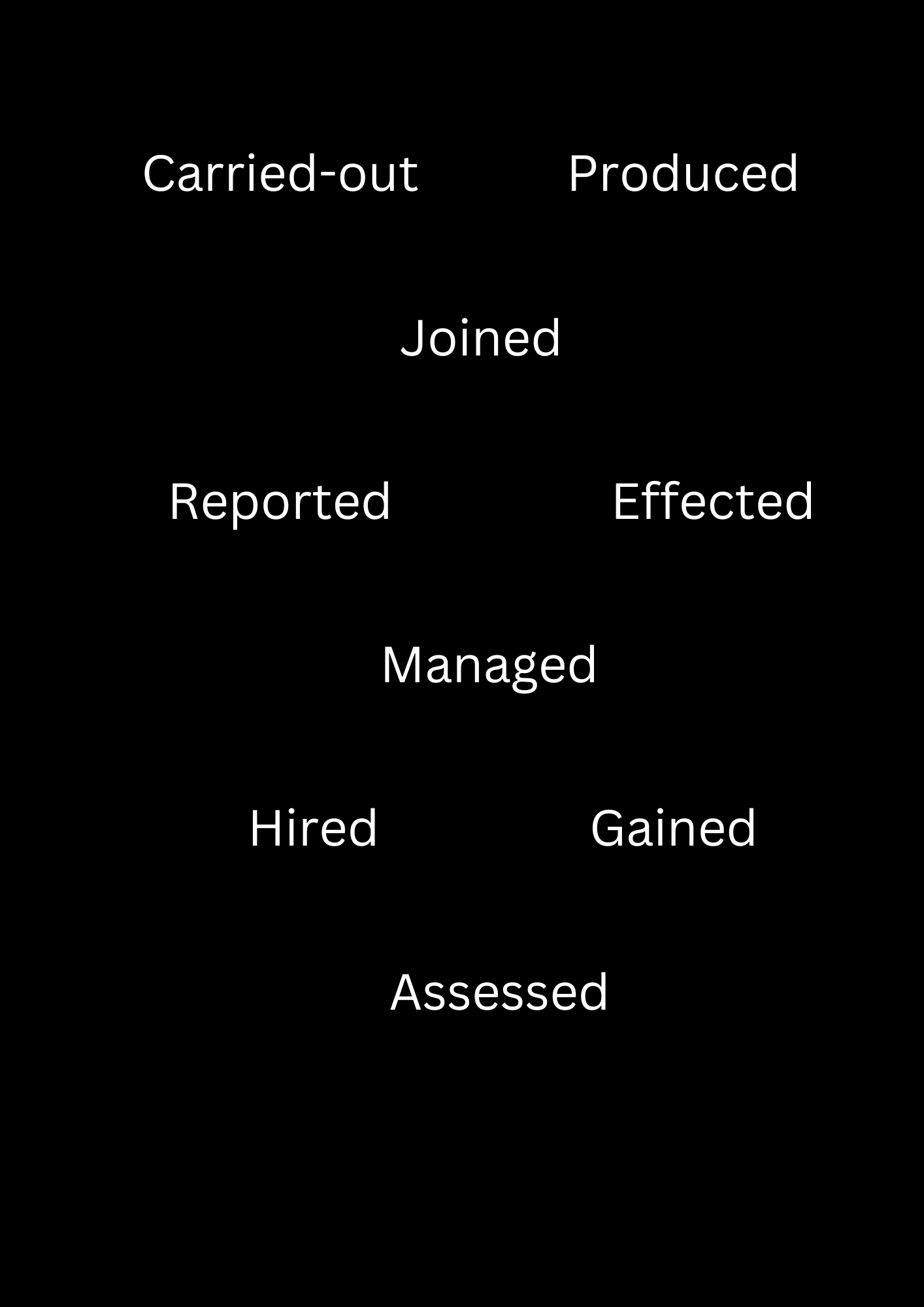When creating a resume, one of the toughest issues you face is figuring out what keywords you should use in a resume. Every job posting, even if it is for the same job, is different and your resume should reflect that. That’s why your resume should be tailored for each job you apply to, and keywords are an important part of that.
In this article, we’ll tell you what keywords are, how to identify them, where they can be used in a resume and where not to use them.
Try our Keyword Finder tool for an easy way to identify keywords.
What is a keyword and why is it important?
For a single job, companies receive hundreds of resumes, and they don’t have the time to go through all of them. Most companies use ATS or Applicant Tracking Systems to scan resumes and select the top candidates and ATS works based on keywords. Therefore, having keywords is essential to making sure your resume passes the initial test.
How does ATS work?
A hiring manager inputs several words or keywords that they are searching for into the system. The ATS scans the resumes, and assigns a ranking based on how many keywords are present in a resume. The ones with a higher number of keywords are then displayed to the hiring manager. As ATS is only a machine, it will only consider the relevant keyword and not any similar words.
For instance, when ATS scans for the keyword Master of Business Administration, the acronym MBA will not register even though it means the same thing.
What if a company doesn’t use ATS?
Even if a company doesn’t use ATS, research shows that hiring managers spend an average of 7 seconds on a resume. How do they go through a resume so fast? They essentially do the same thing as ATS, they scan for keywords. So, it doesn’t matter if the company uses ATS or not, you still need to tailor your resume to the position with keywords.
How do you identify keywords?
It isn’t easy to know what keywords are important. Here’s a guide to effectively identify keywords in two easy steps.
1. Read the posting carefully and highlight important phrases
The first step is to copy the posting and highlight important words in the listing. These are often the keywords you will need.
Take this example of a data entry posting.

2. Divide the identified words into a list
Take the above example and divide the keywords into a list of work experience, skills and action verbs. Now you can go through and identify what applies to you. Then you can use the same words in your resume. Don't lie and say you have skills that you don't have just because it is a keyword.
| Job Experience | Skills | Action Verbs |
|---|---|---|
| Effective systems | Team player | Maintain |
| Payer research and territory assignment | Communicate effectively | Identifying |
| Onboarding and training team members | Computer application | |
| 3 years in customer service or healthcare | ||
| 1 year in data entry |
How to use keywords in a resume?
Keywords can be added to any place in the resume as long as it makes sense. You can be strategic when you are adding keywords by placing them in sections that hiring managers expect to see them.
Keywords in Resume Profile
An easy place to add keywords is in your resume profile. One of the best keywords you can always add is the company name.
Eg. Marketing professional with over 5 years' experience in digital marketing and looking to attract more customers to XY company as a senior marketing lead.
We also have a great article on how to write a successful resume summary that you might find useful to figuring out how to add keywords.
Keywords in Work Experience
Work Experience is a great place to add action verbs that really make your resume stand out. Companies always want to know how you can add value to the company, rather than your job responsibilities. Action verbs can show how you can help grow the company by illustrating how well you performed in your previous jobs.
List of Keywords for Resume in Management

List of Keywords for Resume in IT

List of Keywords for Resume in Sales and Marketing

Want more action verbs? Read our articles on 200+ Action Verbs you should Immediately Try on your Resume or How to list work experience on a resume right way.
Keywords in Education
Do you know that the name of your degree is also a keyword? Most job postings will also have a minimum education requirement. If you meet it, you can type it in your resume the exact way it looks on the listing.
Eg. The listing asks for a Bachelor of Business Management degree or other related degrees. If you have a Bachelor of Entrepreneurship, you can add it because it is a related degree and there’s a chance Entrepreneurship is a keyword. Remember if you type it as BA Entrepreneurship in your resume, when the listing says Bachelor, the ATS won’t register it as a keyword.
Keywords in Skills
Keywords can be used as both hard and soft skills.
For a software developer, the hard skill “Python” could also be a keyword. In the same way, team player in the above listing is also a soft skill that can be added to a resume.
For ideas on which skills to use on your resume, read Best Resume Skills to put on your Resume 2024.
How not to use keywords in a resume
Just because keywords are all powerful, doesn’t mean that there isn’t a wrong way to add them. Below are some of the common mistakes when adding keywords to a resume.
Adding too many keywords
Also known as keyword stuffing, many applicants add keywords indiscriminately in their resume to try and fool ATS. What you must remember is that ATS is only the first hurdle in the process and your resume gets passed along to a hiring manager in the next step. They will immediately understand what you have tried to do, and it will give a bad impression to boot. Always use keywords where it is relevant or makes sense in context rather than try to stuff too many and risk not passing on to an interview.
Adding buzzwords
Buzzwords or cliches are negative keywords. They are called cliches because everyone uses them and hiring managers are tired of seeing the same old thing. Make sure your resume is fresh and unique by adding action verbs that give a strong sense of what you have achieved.
Want to know what buzzwords to avoid in 2024? See 90 Killing Resume Buzzwords to Avoid and Include in 2024.
Do you know if you have added negative buzzwords to your resume? Try Cresuma’s Buzzword Checker now and discover what buzzwords you have on your resume.
Lying on a resume through adding keywords
This is a fairly straightforward rule. DON’T LIE ON YOUR RESUME!
Maybe you think of adding a couple of keywords, but it isn’t something you have experience in. Trust me, even if you pass the first stage, you are going to get caught at the interview. In addition, you can be blacklisted from the company so that when you do send a truthful resume in the future, they will immediately discard you and you might lose a great opportunity.
Key Takeaways
An important factor in your resume is the keywords you use. If you do not use keywords for your resume, you will most likely pass neither ATS screening nor get selected for a job that you are qualified for. You should know how to identify keywords in a job listing, where to use them and when not to use them.
Remember the best way to make sure your resume is seen is to place keywords in strategic places.
If you want to forget about the whole process and just have the keywords identified for you, check out Cresuma’s Keyword Finder.
And if you want more handy hints on how to create a resume, see some of the resume building tips we have found for you.
And check out more articles in our career guides.

